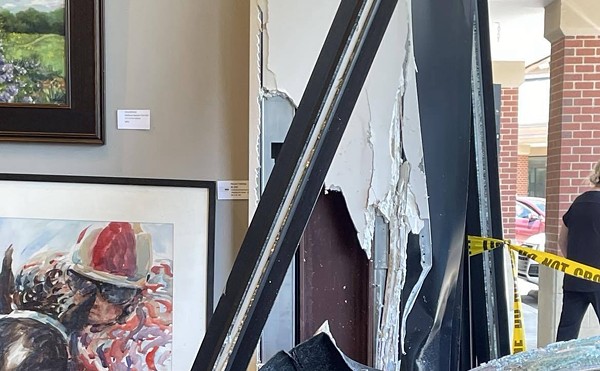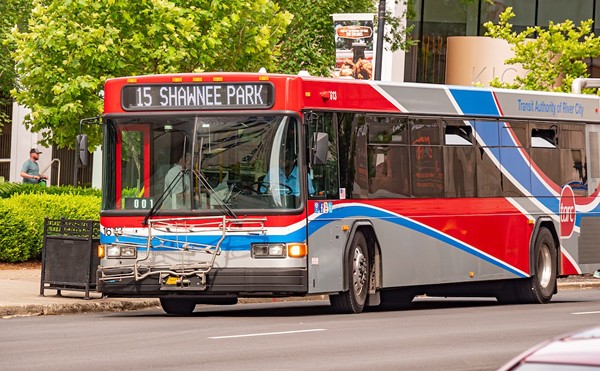West Broadway will stay closed, judge says
Standing in a federal courtroom in Louisville Monday afternoon, legendary comedian and civil rights activist Dick Gregory had mixed emotions. A ruling by Judge Jennifer Coffman upheld the city’s plan to close West Broadway between 9th and 34th streets on Derby weekend, a plan criticized for being racist and discriminatory to West Louisville businesses, many of which are owned and operated by African Americans.
Gregory heard a note of triumph amid the defeat of the request for a preliminary injunction — to halt the city’s closure plans — in a lawsuit led by the Rev. Louis Coleman and the Justice Resource Center.
“When we started off , there would have been no blacks on the other side and no woman judge,” Gregory said. “There’s a victory just looking at that.”
He maintained, however, that a closure of the busy West Louisville thoroughfare “is a racist thing.”
Derby cruising in West Louisville began in some form more than two decades ago. It wasn’t until last year’s introduction of a full closure of West Broadway during Derby weekend, though, that West Louisville residents were not only prohibited from cruising but kept off Broadway almost entirely.
Gridlock and “rampant violence” forced Metro Government toward the ban, said Chad Carlton, Mayor Abramson’s director of communications. And a video presented in court depicting cruising from years past gave Coffman enough evidence to believe safety is a major concern at the annual event.
Foot traffic will be allowed on Broadway during Derby weekend, and vehicles can access the thoroughfare with a police-issued pass. But many West Louisville residents, led by Coleman, are rallying against what they call blatant discrimination and racism.
King Downing, the national coordinator for the American Civil Liberties Union’s “Campaign Against Racial Profiling,” said the city’s plan to shut down Broadway “fits the classic mold of racial profiling.
“It’s a denial of people’s First Amendment rights to assemble and move freely,” Downing said. “It reminds me of the apartheid system in South Africa.”
West Louisville residents, some of whom packed the courtroom Monday, were concerned that their neighborhood had been targeted for “lockdown” while other areas of the city remain open. They’re upset that businesses west of 9th Street — most in Louisville acknowledge that as the city’s racial divider — cannot participate in the money-grab of Derby weekend. The lawsuit will proceed, and the plan could be outlawed next year, depending on the outcome.
Community residents recognize the problems associated with cruising, though they had hoped for a compromise that would allow traffic on Broadway in a more controlled manner, Coleman said.
A report by the Human Relations Commission given to Mayor Abramson in September — a follow-up to a community forum in July — provided several suggestions to alleviate problems, including opening a single lane of traffic and providing parking for the West Broadway Vendor’s Fair (canceled this year) at the old Philip Morris site.
Ramon McGee, the attorney voluntarily representing Coleman and 10 businesses on West Broadway, told the judge Monday that the closure beginning at 9th Street was clearly acknowledgment of a racial line of demarcation.
“I don’t believe there’s anyone in this courtroom who doesn’t understand what 9th Street means,” he said, noting the freedom of movement allowed this year to businesses east of 9th, like Fourth Street Live, the Brown Hotel and The Courier-Journal, which were included in the 2006 closure.
Metro Government and Police Chief Robert White maintain that public safety is the issue at hand, not discrimination. Citing a murder and multiple sexual assaults on West Broadway during Derby weekend in 2005, White said he was pleased with the judge’s decision.
“The decision will allow us to ensure no lives are lost,” White said. “There are no shootings, robberies or rapes on Bardstown Road or at Churchill Downs — if you did have that, we would be doing the same thing.” —Melissa Moody
Smog ’em if ya got ’em
Take a deep breath, Louisville. That delicious aroma is the smell of the U.S. Environmental Protection Agency’s proclamation that Louisville now meets federal standards for ground-level ozone, nemesis of allergy sufferers and other people fond of breathing. (Well, that plus the elephant ears at Fest a Ville.) Ground-level ozone (“smog” to the casual breather) occurs when sunlight — which industry is currently trying to blot out — interacts with car emissions, coal-burning power plants and other pollutants.
Thanks to cleaner cars and tighter restrictions on power plants, the city is in compliance with EPA smog limits, pending a 30-day public-comment period, which ends well in advance of the Ohio Valley cough-up-a-lung summer breathing season. (E-mail your adventures in breathing to [email protected].) Besides the advantage to breathers, the proclamation is helpful to the city in its efforts to attract new businesses, ideally ones that don’t smog up the joint.
So breathe deep, Louisville. Just not too deep. We’ve got a handle on smog, but you wouldn’t want to suck in too much soot, butadiene, trichloroethylene, chromium, acrylonitrile, carbon tetrachloride … —Jim Welp
Arena comes with extended warranty package
When Louisville struck a deal to build a shiny new cathedral to basketball, the state agreed that Louisville wouldn’t have to pay operating expenses to keep the arena afloat. Instead, the city agreed to pay $6.8 million annually over 30 years to help finance construction, plus another $3.5 million if needed.
Now, the Louisville Arena Authority wants the city to help pay operating expenses, which caused a minor spat between Metro Councilman Jim King and Arena Authority chairman Jim Host. King wants no part of paying operating expenses, even though the position could signify a lack of confidence in the arena’s financial viability, which could ultimately make the arena more expensive through a capitalistic Catch-22 known as bond funding. Host did what he does best: stamped his feet, gathered up his Legos and went home.
What both men understand is that public arenas are notorious money losers, pissing away cash like a neocon on a freedom-spreading bender. City psychotherapist-in-chief (Mayor) Jerry Abramson grabbed both men by the ear and, after group counseling, emerged with language that mirrors King’s position, but that ultimately won’t be nailed down until the Council agrees on a bond ordinance.
What’s a taxpayer to do? Drink the sweet photoshopped nectar of the arena’s comfy seating and superior sightlines, conveniently PDF’d last week at www.arenaauthority.com. The arena’s design, which brings fans closer to the floor and provides wider seats for today’s modern asses, should take some of the sting out of having one’s wallet perpetually empty. —Jim Welp
Get your daily Strobe at “The Lip: LEO’s News Blog,” www.leoweekly.com. Contact the writers at [email protected]





